Lebanese Group Condemns Khamenei’s Comment To Expand Influence In Country

A large group of Lebanese politicians have slammed claims by Iran’s Supreme Leader who said recently that Tehran’s influence in Lebanon must be expanded.

A large group of Lebanese politicians have slammed claims by Iran’s Supreme Leader who said recently that Tehran’s influence in Lebanon must be expanded.
The National Council for Ending Iranian Occupation says such remarks are a clear sign of Islamic Republic's intervention in Lebanon.
On Saturday, Khamenei once again called Lebanon a territory in Iran’s orbit, saying the active policy of the Islamic Republic in Lebanon, Syria and Iraq has led to the failure of “US plots” in these countries.
The Lebanese government has not yet reacted to these statements. However, The National Council for the Ending Iranian Occupation in a press conference said that the Lebanese presidential election is being controlled by Iran.
“After seven unsuccessful attempts to elect the president, the signs of fatigue are visible on your faces. The reason for this failure is that Lebanon is occupied by Iran,” added the statement.
According to the Lebanese media, the “Axis of Resistance” is one of how Iran is expanding its strategic influence in the region.
The term Axis of Resistance refers to an anti-Western, anti-Israeli and anti-Saudi political and informal military alliance between Iran, Palestinian militant groups, the Syrian government and the Lebanese Hezbollah.
The National Council for the Ending Iranian Occupation was officially launched in January to break free from Hezbollah's armed hegemony over the country that has always been a threat to Lebanese sovereignty.
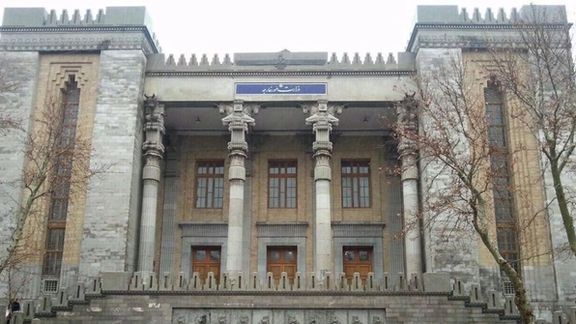
Iran has summoned the French ambassador to Tehran over comments made by the country’s foreign minister in the National Assembly against the Islamic Republic.
Nicolas Roche was summoned on Wednesday to Iran’s Foreign Ministry over what Tehran calls “unacceptable” remarks by Catherine Colonna which led to approval of a resolution in the assembly on human rights in Iran.
Iran says, “the instrumental and dual use of human rights by France and some other European countries causes great regret to the Islamic Republic Iran.”
Tehran also said these countries “lack the legitimacy to raise such human rights claims.”
On Monday, the French National Assembly unanimously adopted a resolution offering "support for the Iranian people" and condemning the restriction of women's freedoms and rights. This comes ahead of another meeting of EU foreign ministers to discuss new sanctions over Iran’s crackdown on protesters.
President Emmanuel Macron's Renaissance party deputy Hadrien Ghomi, himself a descendant of Iranian immigrants, said the 149 votes in favor of the motion in the National Assembly "sent a strong message" to the world. The resolution condemns in the "strongest terms the brutal and widespread repression" against "non-violent demonstrators".
Foreign minister Colonna said the situation "requires action, with responsibility", adding that after two packages of sanctions already imposed at a European level, new sanctions are being prepared for the next Council of Foreign Ministers on 12 December.
Iran constantly accuses the West of double standards and meddling in its domestic affairs but continues to use deadly violence against protesters.
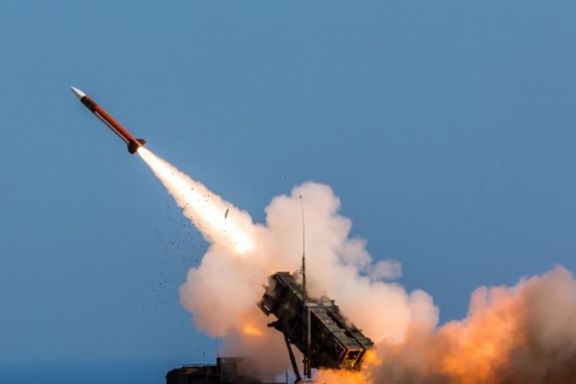
The US State Department has approved the potential sale of an anti-drone system to Qatar in a deal valued at $1 billion, the Pentagon said on Tuesday.
The potential sale approval comes after U.S. President Joe Biden, earlier this year, designated Qatar as a major non-NATO ally of the United States, granting special status to a key friend in a turbulent region.
"Qatar is a good friend and reliable and capable partner. And I'm notifying Congress that I will designate Qatar as a major non-NATO ally to reflect the importance of our relationship. I think it's long overdue," Biden said in January when he met Qatar's emir, Sheikh Tamim bin Hamad al-Thani.
Separately, Qatar has also played a role in the Iran nuclear talks and in relations with Afghanistan, where Washington's interests were represented by the small Gulf country.
The proposed sale will improve Qatar's capability to meet threats by providing electronic and kinetic defeat capabilities against drones, the Pentagon said.
The principal contractors will be Raytheon Technologies Corp RTX.N, SRC and Northrop Grumman Corp NOC.N, the Pentagon said in a statement. It added that the Pentagon's Defense Security Cooperation Agency notified Congress of the possible sale on Tuesday.
It will require the assignment of five additional US government and 15 US contractor representatives to Qatar for five years to support fielding, training and sustainment activities, the statement added.
Despite approval by the State Department, the notification does not indicate that a contract has been signed or that negotiations have concluded.
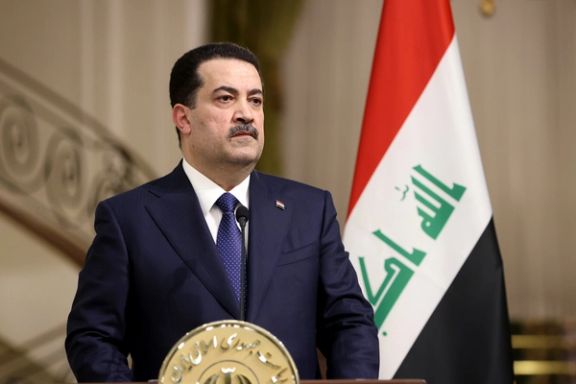
While Iran’s IRGC has launched missile attacks on Iraq’s Kurdistan region, Iraqi Prime Minister says his government will not allow its territory to be used to “harm any side.”
Mohammed Shia' Al Sudani made the comments Tuesday in a meeting with Iranian President Ebrahim Raisi as part of his visit to the Iranian capital.
The Iraqi official said, “It is the policy of the Iraqi government that this country should not be the starting point for actions harming the countries of the region.”
In the meeting, Ebrahim Raisi claimed the Islamic Republic supports a united and strong government in Iraq.
Raisi said relations between Tehran and Baghdad must be expanded to establish more peace and stability in the region and the world.
Since the eruption of nationwide protests in Iran, regime officials have accused Kurdish opposition groups in northern Iraq of fueling the unrest, with the IRGC repeatedly launching deadly attacks on the neighboring country’s northern territories.
The latest round of shelling of Iraqi Kurdistan region drew condemnation by Western countries as well as the Iraqi government.
Iraqi Foreign Minister Fuad Hussein decried the attacks as a violation of Iraq's sovereignty and Kurdistan Region Prime Minister Masrour Barzani also condemned the “violations” of Iraq and its Kurdish region’s sovereignty.
The US also strongly condemned Iran’s “violations of Iraqi sovereignty”, calling on the Islamic Republic to stop attacking its neighbor.

Many countries and international organizations have voiced support for protests in Iran by adopting resolutions and issuing condemnations of government violence, but people wonder about tangible actions.
Many countries and international organizations have voiced support for protests in Iran by adopting resolutions and issuing condemnations of government violence, but people wonder about tangible actions.
The United States Monday circulated a draft resolution on a measure to expel the Islamic Republic from the UN Commission on the Status of Women. The measure to remove Iran from the women's equality and empowerment body is scheduled to be voted on December 14.
The Islamic Republic has just started a four-year term on the 45-member commission, which meets annually every March.
The document also denounces Iran's policies as "flagrantly contrary to the human rights of women and girls and to the mandate of the Commission on the Status of Women." Canada, New Zealand, Netherlands and the United States are behind the push.
The resolution would "remove with immediate effect the Islamic Republic of Iran from the Commission on the Status of Women for the remainder of its 2022-2026 term."
"The US and others have been actively working the phones to garner support to remove Iran from the UN Commission on the Status of Women," said a UN diplomat, speaking on condition of anonymity to Reuters. "It seems like they're making traction – including with some initially hesitant countries."
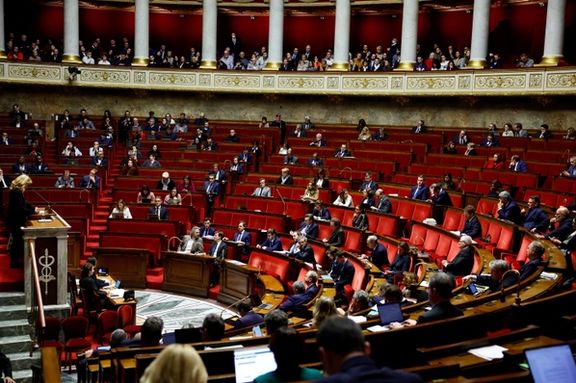
Also on Monday, the French National Assembly unanimously adopted a resolution offering "support for the Iranian people" and condemning the restriction of women's freedoms and rights. This comes ahead of another meeting of EU foreign ministers to discuss new sanctions over the crackdown on protesters.
President Emmanuel Macron's Renaissance party deputy Hadrien Ghomi, himself a descendant of Iranian immigrants, said the 149 votes in favor of the motion in the National Assembly "sent a strong message" to the world. The resolution condemns in the "strongest terms the brutal and widespread repression" against "non-violent demonstrators".
French Foreign Minister Catherine Colonna said that the situation "requires action, with responsibility", adding that after two packages of sanctions already imposed at a European level, new sanctions are being prepared for the next Council of Foreign Ministers on 12 December.
But many Iranians ask if statements and resolutions are enough to pressure the theocratic regime in Tehran. More forceful steps, such as closing all European embassies in Iran or imposing more sanction to directly pressure the ruling elite are possible additional measures people mention in their social media posts.
These all came after the Geneva-based UN Rights Council last week voted to appoint an independent investigation into the Islamic Republic's deadly repression of protests, passing the motion to cheers of activists. Accused Western states of using the council to target Iran in an "appalling and disgraceful" move, Tehran said Monday that it will reject the investigation into the country's repression of antigovernment protests, like it refused to cooperate with UN human rights rapporteurs for 30 years.
Some Iranian officials have started to acknowledge some of its atrocities with Revolutionary Guards general Amirali Hajizadeh saying Tuesday that more than 300 people have been killed in the protests, acknowledging that innocent people have also been killed.
"Everyone in the country has been affected by the death of this lady [Amini]. I don't have the latest figures, but I think we have had perhaps more than 300 martyrs and people killed in this country, including children, since this incident," said Hajizadeh, head of the Guards' aerospace division.
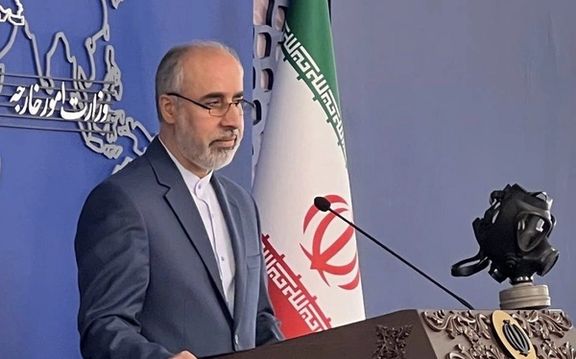
Iran will reject a newly-approved independent UN investigation into the country's repression of antigovernment protests, like it refused to cooperate with UN human rights rapporteurs for 30 years.
In his weekly press conference on Monday, the Islamic Republic foreign ministry spokesman Nasser Kanaani said that "Iran will have no cooperation with the political committee formed by the UN Rights Council," referring to the UN Human Rights Council’s Thursday resolution based on which an international panel will be formed to investigate the violence against protesters.
Kanaani made the remarks as he showed up at his weekly press conference with a chemical mask, which was apparently meant to allude to Germany's support for Iraqi dictator Saddam Hussein during the 1980-1988 Iraq-Iran war and the alleged supply of material for chemical warfare by Berlin to the Ba’ath regime. Tehran also summoned German envoy Hans-Udo Muzel on Monday over Berlin’s key role in holding the UN Human Rights Council special session.
Criticizing the UN for “the hasty employment of human rights mechanisms and their instrumental use against independent states,” he said such an approach will not provide any help for the advancement of human rights. “The Islamic Republic of Iran will not engage in any cooperation, whatsoever, with the politicized committee established in the name of a fact-finding mission.”
Kanaani said that Iran has set up a national committee comprised of experts, lawyers, official and non-official representatives “within the framework of its national responsibilities which is carrying out an in-depth investigations into the current developments across the country.”
Repeating earlier unsubstantiated claims that foreign countries and their agents are instigating the unrest in Iran, Kanaani said, "We have specific information proving that the America, Western countries and some of American allies have had a role in the protests" without disclosing any details.
Many human rights organizations have criticized the Islamic Republic for not allowing UN Special Rapporteurs on the Human Rights Situation in Iran since 1992. Javaid Rehman, the current rapporteur whose mandate was extended earlier in the year, was appointed July 6, 2018, following Asma Jahangir and Ahmed Shaheed who served before him. The HRC had re-established the mandate of a rapporteur on Iran’s human rights situation in 2011 after terminating an earlier one in 2002.
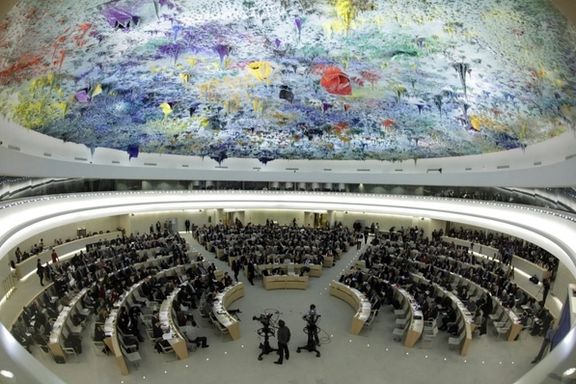
The UN Human Rights Council voted November 17 -- 25 votes in favor, six nays and 16 abstentions -- to launch an independent investigation into Iran's deadly repression of protests, which has killed hundreds of civilians. According to the US-based Human Rights Activists News Agency (HRANA), from September 16 until Friday, November 25, at least 448 protestors have been killed, of which 63 were minors. While the Islamic Republic has not provided accurate figures of those detained in the protests, the watchdog went on to say that at least 18,170 protesters have been arrested including 565 students. HRANA added that 156 cities and more than 140 universities across Iran have also been the scenes of anti-government protests.
On Sunday, the UN Children's Fund also censured the violence against children in Iran, calling for an end to all forms of abuse directed at children.
In another global move over Iran’s denial of women's rights and crackdown on protests, calls on the UN to expel the Islamic Republic from the UN Commission on the Status of Women are also getting stronger with Canada, New Zealand, Netherlands and the United States behind the push. UN Watch, an independent non-governmental human rights group based in Geneva, has drafted a resolution for the 54-nation UN Economic Social Council (ECOSOC) to remove Iran.